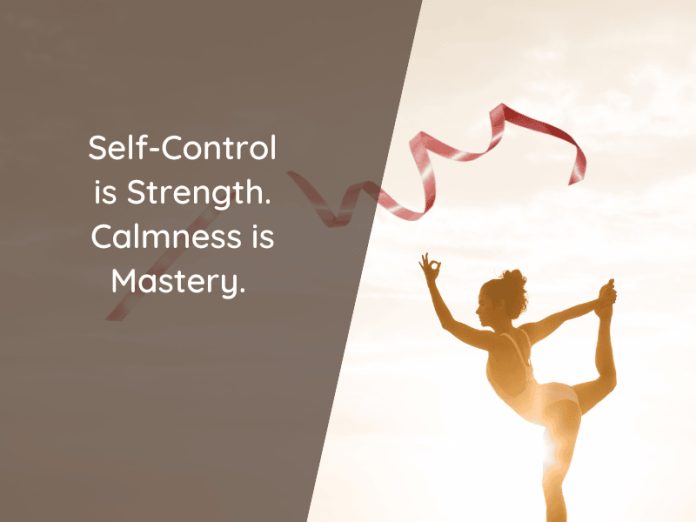Contrary to popular belief, self-control is not self-deprivation or punishment. Instead, self-control creates habits that help manage your emotions, impulses, and behaviors while avoiding destructive patterns to achieve a prosperous and fulfilling life.
In 1902, James Allen wrote the classic self-help book, “As a Man Thinketh.” Allen’s often-quoted phrase, “Self-control is strength. Right thought is mastery. Calmness is power” can be found within the eighty-page tome.
According to Goodreads, Allen’s “books illustrate the use of the power of thought to increase personal capabilities.”
Here, we’ll delve into what self-control is, its benefits, and how achieving calmness is true power.
What is Self-Control?
According to Psychology Today, self-control “is what separates humans from the animal kingdom.” It is taking control over your actions while ignoring immediate impulses.
Often referred to as discipline, determination, grit, willpower, or fortitude, employing self-control allows you to forgo your immediate, short-term desires in exchange for long-term goals or rewards.
Predominantly found in the prefrontal cortex, the area of the brain involved in planning, problem-solving, and decision-making, self-control is part of the executive function toolbox of skills that allows you to regulate your emotions and behavior to ultimately attain your goals.
3 Main Types of Self-Control
As part of the executive function suite, self-control is more than just a generalized form of self-restraint. There are, in fact, three main types of self-control that can help you lead a more balanced, healthy, and prosperous life.
1. Impulse Control
This type of self-control involves thinking before acting and considering the consequences of your actions instead of giving in to your wants and impulses.
Individuals with poor impulse control tend to act or speak without thinking, interrupt during conversations, talk too much, overreact, and even procrastinate.
2. Emotional Control
With this type of self-control, you are able to remain calm and regulate your feelings and emotional reactions.
Individuals who lack emotional control, typically become overwhelmed by their feelings, being unable to manage strong emotions and get past their bad moods.
They also tend to overreact to seemingly minor issues, become overly excited, and have difficulty calming down from a good or bad mood.
People with limited emotional control often give up when frustrated and are unable to handle criticism graciously.
3. Movement Control
This form of self-control involves managing how and when you move your body.
Limited movement control shows up as an inability to sit still, restlessness or fidgeting, invading other’s personal space, and disrupting activities due to distracting movements.
Any one individual can face issues with one or all types of self-control. However, practicing restraint is the true power behind a calm mind and body.
Achieving Self-Control
There is no doubt that attaining self-control takes work. Whether self-control is an “innate individual difference” or a skill that can be learned and developed, there is no doubt that it is a powerful skill in reaching a calm body and mind.
Researchers believe that self-control can be a limited resource and that it should not be spent on any one task as there would be little left for other activities. This is called “ego depletion.”
However, practicing desirable behaviors and habits can strengthen self-control over time.
Desirable habits and behaviors can be achieved by avoiding temptations and known triggers that can throw you off course.
Instead, find routines and rewards that support the habits you want to build upon. Additionally, piggyback on already established habits to make it easier for you to follow through.
Mindfulness and meditation can help you quiet your mind and body, and allow you to focus on what’s in front of you.
Furthermore, focusing on “why” you want to achieve your goal rather than focusing on “how” you’ll get there can prove more productive.
Therefore, exercising restraint can help you build on the power of calmness and discipline.
Benefits of Self-Control
While not an easy feat, attaining self-control is important in reaching well-being and success in life.
Research published in the Journal of Personality discovered “that people who have better self-control tend to be healthier and happier, both in the short term and in the long term.”
Additionally, another study found “that high levels of self-control during childhood predicted greater cardiovascular, respiratory, and dental health in adulthood, as well as improved financial status,” proving that self-control can have lifelong, powerful benefits.
Final Thoughts on Self-Control and the Power of Calmness
The power of calmness can be achieved through self-control. Avoiding the temptation of short-term rewards and triggers that can derail good habits and behaviors is a true strength that can be improved over time.
The result can be a prosperous and fulfilling life.
Sources
https://www.goodreads.com/author/show/8446.James_Allen
https://www.psychologytoday.com/us/basics/self-control
https://psycnet.apa.org/doiLanding?doi=10.1037%2Fa0019486
https://onlinelibrary.wiley.com/doi/10.1111/jopy.12050
https://www.pnas.org/doi/full/10.1073/pnas.1010076108

